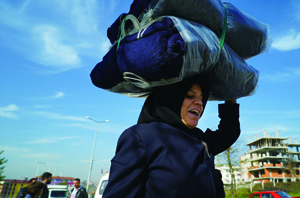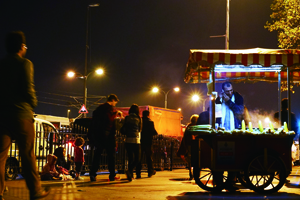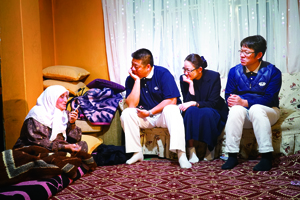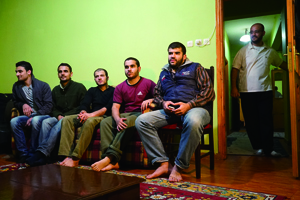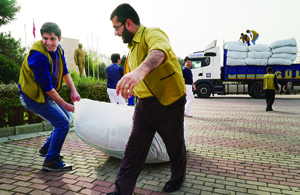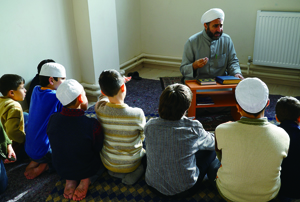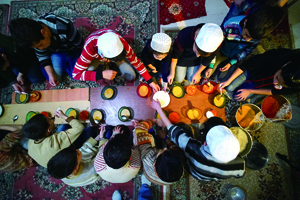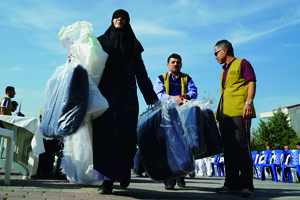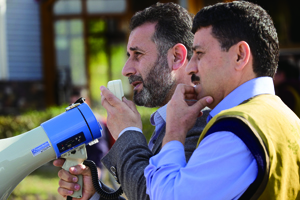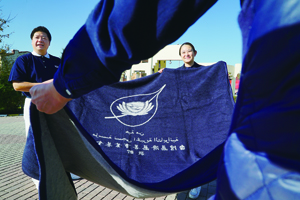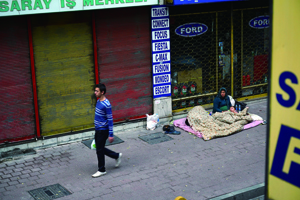

| Home Was Beautiful Once: Syrian Refugees in Turkey | ||||||||||||||||||||||||
| Text and photos by Hsiao Yiu-hwa Translated by Tang Yau-yang | ||||||||||||||||||||||||
There are more than a million Syrian refugees in Turkey. They live in poverty, not knowing when they will be able to go home. The protracted civil war in Syria has made their once beautiful country a frightening and dangerous place. A refugee professor is working with Tzu Chi volunteers in Turkey to provide humanitarian aid to his own fellow countrymen.
A small restaurant in an old part of Istanbul, Turkey, posted a small note on its door announcing a vacancy for a cleaner. The note did not specify any qualifications for prospective applicants, but it did tersely state who was not welcome to apply: “No Syrians.” What a difference the Syrian civil war has made. The country used to be one of the most highly educated nations in the Middle East, but it became entangled in civil war in the wake of the Arab Spring revolutions that started in 2010.The fierce fighting in Syria that began in 2011 impelled three million people, half of them children, to flee the nation. More than a million went to Turkey. “That’s just the number of those that are officially registered. There have been a great many more that have entered illegally,” said Faisal Hu (胡光中), a Tzu Chi volunteer living in Turkey. Out of the 1.6 million Syrian refugees there, only 220,000 are in the 22 fully operating refugee camps at the border of Turkey and Syria; the rest have scattered around Turkey fending for themselves. How are these people doing?
In limbo On a November day in 2014, the weather was crisp and cold in Istanbul. The setting sun painted the New Mosque on the Bosphorus gold. The call for prayers, the adhan, sounded, calling faithful Muslims to stop and pray. The atmosphere in the mosque was solemn and respectful. The spice bazaar close to the mosque in this popular tourist district, brightly lit and bustling with shoppers, was another picture. Pigeons gathered in front of the mosque, fighting for crumbs that people had scattered for them. Also in the area, some people—less fortunate than the birds—were begging to survive. The last group of people was who we had come here to see. As we photographed and videotaped them, some passersby stopped to ask us why we were interested in these beggars. “Don’t ever mistake them for Turks,” they said to us with a slight touch of disdain in their voices. “They’re Syrians.” In fact, we were already very aware of just who they were. We had learned about the plight of Syrian refugees struggling to scrape by in Turkey, so we came here to record it. Having nowhere to turn, these refugees, mostly women and children, panhandled on the streets. We saw kids dressed in shabby clothes, some even barefoot, begging for money. “I met a little barefoot girl one day begging for money,” Hu said, recalling an encounter a few months earlier. “I asked her if she was from Syria, and if she could take me to see her home.” She agreed, and so they took a short train ride and walked some way to an area where many Syrians lived. Hu had seen refugees streaming into Turkey for more than three years, but not until that moment did he realize how difficult their life was. He saw women and children living outdoors and children combing through garbage cans for scraps of food. His heart went out to these people as he pondered what he could do for them. He went to Taiwan and reported to Master Cheng Yen the adversity he had witnessed. The foundation decided to help.
However, even with the solid support of Tzu Chi in Taiwan, there was no guarantee Hu would be able to help Syrian refugees in Turkey. There were fewer than ten Tzu Chi volunteers in the country, so they would need help if they wanted to reach out effectively to the Syrians. Just when Hu was racking his brain on how best to proceed, Professor Cuma Serya came to him. Serya used to be a college professor of the Arabic language in Syria, but the civil war had forced him to flee to Turkey. He had wanted to do something to help his struggling fellow refugees, but he lacked the resources to do so. A former student of his from Taiwan told him about Hu, so Suri got in touch with the Tzu Chi volunteer. That’s how two non-Turks, both living on Turkish soil, started working together, hoping to make a dent in the suffering of Syrian refugees. Their immediate goal was to hold large-scale distributions of daily necessities for those displaced from Syria. The work was split like this: Hu, his wife Zhou Ru-yi (周如意), and Yu Zi-cheng (余自成), another Tzu Chi volunteer in Turkey, set out to procure blankets and food for the distributions; Professor Serya would enlist help from his fellow countrymen and work on identifying aid recipients and recruiting volunteers to help in the distributions.
Education for the young Many refugees, like the professor, used to have good jobs in Syria, but none of that mattered in their host country. A good many of them, if they could find work at all, ended up in menial jobs. Even worse, they got paid less than Turks for doing the same work. Since they could not work legally, they could not complain about the lower wages. After they had paid rent with their meager incomes, not much was left to pay for anything else. As a result, many children were forced to quit school just so they could work to help support their families. “War is the most stupid thing that man can do,” Professor Serya lamented, pouring out his worries to us. “Just a few years of war can ruin the educational foundation of a nation, and the damage cannot be repaired fully even with a hundred years’ work. A child without education is a child without hope for the future, especially a child in exile.” Like the professor, many refugees also worried about the education for the young. Some of them had banded together to provide Syrian children with an education. They set up a learning facility where children could receive lessons, live, and eat for free. The facility was located in a building space that some kind-hearted people had provided to the group without charge. A few volunteer teachers taught there. Professor Serya led Tzu Chi volunteers on a tour of the facility. It was winter and very cold, but the children were sleeping on cardboard mats with thin covers. “Aren’t you cold?” Hu asked. “Yes, we are” they answered. In response, Tzu Chi volunteers delivered blankets and mattresses to them. There were many refugees who badly needed help—far more than Tzu Chi could cover. Therefore it was necessary to identify those most in need. Hu joined Professor Serya and some ten Syrian volunteers the professor had recruited to make a roster of recipients for the distributions. Starting two weeks before the distributions, they called on Syrian families at their homes each day after work to assess their situation firsthand and determine whether or not to include the family on the roster.
Relief distributions Since it was winter, it could get cold at night, below ten degrees Celsius (50 degrees Fahrenheit), so blankets, which were to be among the items distributed, would come in handy indeed. However, Hu had much to do before that could happen. For several weeks, he worked closely with a local blanket manufacturer and Tzu Chi headquarters in Hualien, Taiwan, to iron out all the issues and make all the necessary arrangements. “We’ve finally gotten hold of the blankets for Syrian refugees. These blankets are light, soft, and warm,” Hu said, his tone conveying his excitement. Each blanket measured 2.3 by 1.8 meters (7.5 by 5.9 feet), and was about a centimeter (0.4 inch) thick.
Volunteers shopped around for other distribution items and found the best values at a BIM store. They decided to purchase 11 types of food, including pasta, rice, wheat, cooking oil, flour, green lentils and red lentils. Hu paid for the purchases with large wads of cash. He and his wife explained to us that checks are not usually accepted for purchases in Turkey, so they had to use cash, even for big purchases.
Now that the blankets and food were taken care of, volunteers prayed for nice weather so things would go smoothly at the distributions, which were scheduled on four days. The first one took place on November 8, 2014, at a community center in the Arnavutköy district of Istanbul, followed by another one the next day at a cultural center in the Sultangazi district. Blankets were the only items given out on these two days. Food would be distributed a week later. About 50 volunteers set up the distribution venues beforehand. Tzu Chi volunteers in Turkey, Professor Serya and the Syrian volunteers he had recruited, Taiwanese students studying in Turkey, members of a Taiwanese chamber of commerce, and city councilman Zeki Demir participated in the distributions. Deputy Mayors Kemal Aygenli and Bekir Koç of Arnavutköy and Sultangazi also helped out at the distributions held in their districts.
Syrian volunteers, chanting the Quran, opened the distribution. Hu, his wife, and their son, Hu Yun-kai (胡雲凱), then read a letter of sympathy from Master Cheng Yen in Turkish, Mandarin, and Arabic to the gathering. Volunteers put their right hands on their chests to greet the recipients, then bowed low and handed blankets over to them. Family size determined the number of blankets provided. Some women put their blankets on their heads and walked home hand in hand with their children. They would sleep warmer and more comfortably. Shukran—“thank you” in Arabic—was often heard at the distribution venues as people expressed their gratitude for the goods they had received. The volunteers who helped out were grateful as well. A young Syrian volunteer, Barış, reflected on the events: “I was really touched during the distributions. All I did was pass blankets to be handed over to recipients, but my work was valuable too. I know that an untold amount of hard work had been done before the blankets could be given out, and I’ll never forget such kind help.” Professor Serya said, “I used to know little about Buddhism, but now I see that Islam and Buddhism share the same values: altruistic love, large-heartedness, and peace. My involvement with the distributions has given me a better understanding of Buddhism.” Yan De-fen (顏德芬), a member of the Tzu Chi Collegiate Association from California, was studying in Turkey; Lian Yi-jing (連翊晶), from Taiwan, moved to Turkey after she got married; Wang Yu-zhen (王玉珍) was deputy director of a local Taiwanese chamber of commerce. Though different circumstances had brought them to the nation, they all volunteered their services, and they all felt that they had gotten something valuable out of the participation. “Although we handed out blankets to keep them warm, it was their smiles that warmed my heart,” Wang said. The distributions of blankets for 1,100 families went off smoothly on November 8 and 9. Food packets—each containing 11 items—went out to 970 families on November 15 and 16 at the same venues in Arnavutköy and Sultangazi. Some refugees, even after having worked a long 12-hour shift, volunteered to help in the distributions. Ahmad, one of the volunteers, said, “In my own country, I used to have a loving family and a peaceful life. Syria was beautiful before the war.” The difficult life in a foreign land made him want to reach out to help his fellow countrymen. Manar, another Syrian, said, “I’ve prayed for peace, and I’ve seen the first sign of peace emerging, with Tzu Chi at the forefront.” Another volunteer added, “I hope that one day there will be no weapons in the world, and that no passports will be necessary because people will be seen not as Americans, Asians, or Arabs, but as brothers and sisters.” That is not just his hope, but also the hope of Tzu Chi volunteers. [Editor’s note] A bit of good news has come for refugees featured in this article and their fellow displaced countrymen. In December 2014, the New York Times featured an article, “Turkey Strengthens Rights of Syrian Refugees.” The article reported that the Turkish government has granted the refugees “access to basic services like health care and education…[but] stops short of granting Syrians official refugee status, which would entitle them to a broader array of benefits like housing, public relief and various social services.”
|













|

